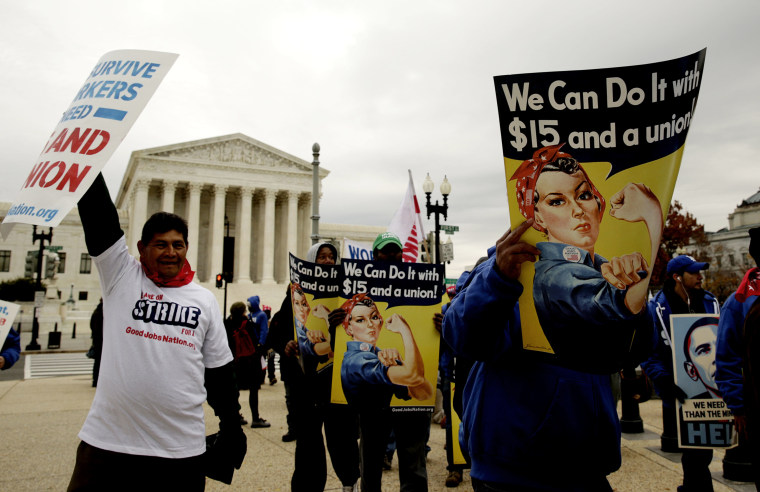This column is part of "The State of America," an msnbc.com series leading up to President Barack Obama’s 2015 State of the Union Address on Tuesday, Jan. 20. This is the state of the issues you care about, as told by organizations promoting social change and other policy experts.
The president has an opportunity in the State of the Union to tell the truth about the economy: Jobs are coming back, but wages aren’t. In December, the average wage actually dropped.
The deeper truth is that this recovery, like the last five recoveries, masks the longer-term decline of most peoples’ wages -- and the decline of the American middle class.
Three decades ago, we took a giant U-turn.
In the first three decades after World War II, America created the largest middle class the world had ever seen.
"This recovery, like the last five recoveries, masks the longer-term decline of most peoples’ wages -- and the decline of the American middle class."'
During those years, the earnings of the typical American worker doubled, just as the size of the American economy doubled. By 1960, the income of a single school teacher or baker or salesman or mechanic was enough to buy a home, have two cars, and raise a family.
Over the last thirty years, by contrast, the size of the economy doubled again but the earnings of the typical American have gone nowhere.
In that earlier period, more than a third of all workers belonged to a trade union — giving average workers the bargaining power necessary to get a large and growing share of the large and growing economic pie.
Now, fewer than 7% of private-sector workers are unionized.
Then, CEOs of America’s largest corporations were paid an average of about 20 times the pay of their typical worker. Now their pay is well over 200 times.
In those years, the richest 1% took home 9 to 10% of total income. Today the top 1% gets more than 20%.
Then, the tax rate on highest-income Americans’ top dollars never fell below 70%; under Dwight Eisenhower, a Republican, it was 91%. Today the top tax rate is 39.6%.
Related: The richest 1% will soon control more wealth than the rest of the world combined
In those decades, tax revenues from the wealthy and the growing middle class were used to build the largest infrastructure project in our history, the Interstate Highway system. And to build the world’s largest and best system of free public education, and dramatically expand public higher education.
Since then, our infrastructure has been collapsing from deferred maintenance, our public schools have deteriorated, and higher education has become unaffordable to many.
In that earlier period we also enacted the Civil Rights Act and Voting Rights Act to extend prosperity and participation to African-Americans; Medicare and Medicaid to provide health care to the poor and reduce poverty among America’s seniors; and the Environmental Protection Act to help save our planet.
And we made sure banking was boring.
It was a virtuous cycle. As the economy grew, we prospered together. And that broad-based prosperity enabled us to invest in our future, creating more and better jobs and a higher standard of living.
Then came the great U-turn, and for the last thirty years we’ve been heading in the opposite direction.
Why the U-turn?
Some blame globalization and the loss of America’s manufacturing core. Others point to new technologies that replaced routine jobs with automated machinery, software, and robotics.
"The collective erasure of the memory of that prior system of broad-based prosperity is due partly to our failure to retain and pass on the values on which that system was based."'
But if these were the culprits, they only raise a deeper question: Why didn’t we share the gains from globalization and technological advances more broadly? Why didn’t we invest them in superb schools, higher skills, a world-class infrastructure?
Others blame Ronald Reagan’s worship of the so-called “free market,” supply-side economics, and deregulation. But if these were responsible, why did we cling to these ideas for so long? Why are so many people still clinging to them?
Some others believe Americans became greedier and more selfish. But if that’s the explanation, why did our national character change so dramatically?
Perhaps the real problem is we forgot what we once achieved together.
Photo Essay: A look at South Dakota lives balanced on the minimum wage
The collective erasure of the memory of that prior system of broad-based prosperity is due partly to our failure to retain and pass on the values on which that system was based.
We must restore our recollection. In seeking to repair what is broken, we don’t have to emulate another nation. We have only to emulate what we once had.
That we once achieved broad-based prosperity means we can achieve it again — not exactly the same way, of course, but in a new way fit for the twenty-first century and for future generations of Americans.
This is what the president should say in his State of the Union:
America’s great U-turn can be reversed. It is worth the fight.
Robert B. Reich is Chancellor's Professor of Public Policy at Berkeley and former Secretary of Labor.
